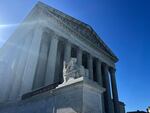
The U.S. Supreme Court made it far more difficult for federal agencies to issue rules and regulations that carry out broad mandates enacted by Congress.
Chip Somodevilla / Getty Images
The U.S. Supreme Court on Friday undid decades of regulatory law, making it far more difficult for federal agencies to issue rules and regulations that carry out broad mandates enacted by Congress. Along ideological lines, the court reversed a 40-year-old precedent that has governed what agencies can and cannot do in interpreting federal statutes.
The decision overturned Chevron v. The Natural Resources Defense Council, a 1984 decision that was not particularly controversial when it was announced 40 years ago. Indeed, the vote was unanimous in declaring that when a statute is ambiguous, courts should defer to reasonable agency interpretations of what it means.
The idea was that when Congress enacts broad regulatory mandates, agencies fill in the gaps, using their expertise to carry out what are reasonably deemed to be Congress’ intent.
But in recent years, conservatives, including some current members of the Supreme Court, have called for the landmark Chevron decision to be abolished. They contended that if Congress isn’t specific enough in its legislating, the highly trained experts at various agencies should not be allowed to interpret what Congress meant.
But drawing that line can be very difficult. For instance, is a new product aimed a lowering cholesterol a dietary supplement, which is regulated one way, or a drug, which is regulated a different way? At oral argument in the case Justice Elena Kagan cited as one example a hypothetical bill to regulate artificial intelligence. Congress “knows there are going to be gaps because Congress can hardly see a week in the future,” she observed, adding that Congress would want experts who know about AI to make decisions about artificial intelligence, not judges who “don’t even know what the questions are about AI,” much less the answers.
That argument, however, didn’t carry the day at the Supreme Court. The conservative supermajority, and its long time opposition to Chevron deference, carried the day instead. As Justice Brett Kavanaugh observed during oral argument in the case deferring to agency interpretations “ushers in shocks to the system every four or eight years when a new administration comes in” and implements “massive change” in areas like securities law, environmental law, and communications law.
In dissent, the liberal justices countered that abandoning Chevron deference will have a ripple effect throughout the government, making it difficult to respond to urgent new problems and limiting the ability of agencies to carry out Congressional mandates on everything from the environment to food and drug safety.
While it is true that in recent years the Supreme Court has not often relied on Chevron deference, it is also true that the lower courts make thousands of decisions deferring or not deferring to agency interpretations. Chevron deference has been the meat and potatoes of regulatory law in the lower courts, so Friday's decision likely will have a profound effect across the government.
The court’s decision came in a case involving a longstanding fishery conservation law that clearly authorizes the government to require trained, professional observers on regulated fishing vessels. The issue wasn’t whether the observers were required; it was whether they had to be paid by the ship owners. In short, if Congress has not specifically addressed the question of who pays, should the court defer to the agency’s view that Congress expected the fishing vessel owners to pay.
The court’s answer was that without specific Congressional authorization, the agency had no power to order the fishermen to pay for their on-board observers.
Copyright 2024 NPR